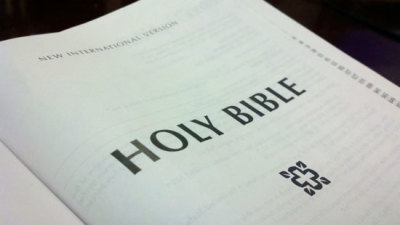ACLU Seeks to Ban Bible Distribution in Kentucky Schools

The American Civil Liberties Union of Kentucky sent a letter Thursday to 174 public school superintendents citing the possibility of a lawsuit in the 2013-2014 academic school year if they continue to allow The Gideons International to distribute Bibles, the New Testament and religious literature to students on public school campuses.
In the letter accompanying the Open Records Act request, William Sharp, the ACLU Kentucky staff attorney, states that the distribution of religious literature on public school grounds during school hours violates federal law. He also accuses elementary school staff of violating federal laws by being complicit in allowing The Gideons International to distribute Bibles to students.
He wrote, "… this practice violates both federal and state constitutional guarantees barring governmental endorsement of religion, and it also impermissibly encroaches upon parents' prerogative to direct the religious upbringing of their children. By allowing an outside group to distribute sectarian materials directly to public elementary school students during school hours, school officials create the impression that the school endorses those religious views which subjects the students to 'subtle coercive pressure' to accept the proffered religious materials."
"As part of that assessment," Sharp continued, "we are also closely examining whether, in an appropriate case, school officials may be personally liable for violations of clearly established federal law."
Michael Aldridge, the executive director of the ACLU Kentucky, said in a statement: "Directing the religious upbringing of one's own children is one of the most fundamental rights a parent can have. When government officials, including school officials, take it upon themselves to usurp that parental prerogative, they exceed their governmental authority and undermine religious liberty.
"The ACLU of Kentucky fully supports the rights of all religious groups to promote their message of faith. Government officials, however, cannot allow our public elementary schools to be used by others to promote one religion over another."
The Gideons International faced similar challenges from the ACLU in Missouri and Tennessee, in which the ACLU claimed that Bible distribution to students in school classrooms and on campus grounds was "unconstitutional."
In Tennessee, the ACLU and school officials in White County, Tenn., settled on an agreement that would ban The Gideons International from entering fifth grade classrooms to distribute Bibles to students, but would allow the distribution of religious and secular materials as part of a forum. The forum, however, would ban the promotion of religious literature, and limit the organization's contact with students.
In Missouri, the U.S. District Court for the Eastern District found in 2008 that "the practice of Bible distribution in the public school of a rural Missouri county was unconstitutional," according to the ACLU website. "The ACLU of Eastern Missouri filed suit against the South Iron School District in February 2006. The court had earlier entered a temporary injunction against Bible distribution, which was upheld by the Eight Circuit appellate court in August 2007."
The ACLU also fought the distribution of Bibles to military recruits in all branches of the Armed Forces, citing that The Gideons International was "granted privileged access" to give away free Bibles and literature to soldiers at Military Entrance Processing Stations.
In 2007, the ACLU sent a letter to the commanding officer of MEPS "to determine the extent to which religious and non-religious organizations were permitted to circulate literature," which prompted the U.S. government's decision to allow all organizations, secular and religious, to distribute literature, thus avoiding the impression that the government endorses Christianity over secular beliefs or other religions.
The Christian Post contacted The Gideons International for comment, but a representative was not available to respond at time of publication.




























